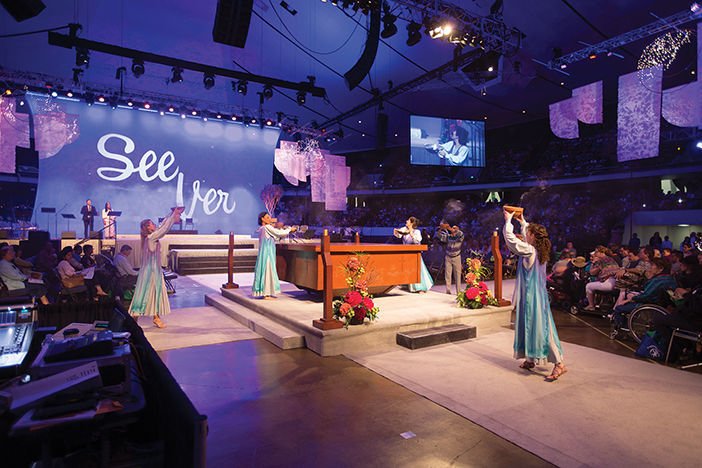An estimated 40,000 united for this year’s Los Angeles Religious Education Congress March 12-15 at the Anaheim Convention Center.
The annual event, which began in 1968, draws Catholics from across the United States and other countries. This year, attendees hailed from 49 different states and 21 different countries, with 13 coming from Pakistan.
“Congress,” as it’s referred to among participants, is four days of liturgies and religious education sessions that focus on theology, apologetics, spirituality, social justice and other aspects of the faith. More than 200 speakers presented over 300 workshops in English, Spanish and Vietnamese.
On March 12, Archbishop José H. Gomez celebrated Mass with more than 15,000 young Catholics on Youth Day.
“The work of Jesus’ words continues through you and though me,” the archbishop said in his homily. “So in the same way, just be normal. Have fun, enjoy life. […] Because Jesus wants to be your friend.”
His advice to the students was to do three things: talk to Jesus, read the Gospels, and do deeds of love and mercy every day.
Richard Alan Jones, an expert in Latin American migration with Catholic Relief Services, spoke of the surge of Central American immigrants into the United States during a March 13 session.
“They aren’t looking for the American dream, they’re fleeing the Central American nightmare,” said Jones, who lives in San Salvador.
Gangs, poverty and even an improving Mexican economy have contributed to the steep increase in immigration from Central America, he said. With the lowest number of Mexican immigrants since the 1970s, human traffickers have targeted Central Americans.
Congress goers also traveled to Christ Cathedral in Garden Grove for the second annual Immigration Summit. Bishops from dioceses in Southern California signed a joint letter to Congress, urging representatives to move forward with comprehensive immigration reform.
“No one denies that our response to immigrants and our immigration system itself has gotten off track,” the letter read. “We urge California’s congressional delegation and our leaders in Washington to come together to implement policies … which promise to bring temporary relief and protection to millions of immigrants,” they wrote.
The bishops also underscored the need to defend the due process for unaccompanied minors, “who under U.S. law and under common humanitarian principles should not be deported without first having a court hearing.”
Leaders of the Archdiocese of Los Angeles and the dioceses of Orange and San Bernardino called all parishioners from Southern California to take action. Archbishop José Gomez, Orange Bishop Kevin Vann, San Bernardino Bishop Rutilio del Riego and the auxiliary bishops of Los Angeles all signed the letter.
Earlier than day, Rick Warren addressed thousands in a packed a packed Anaheim Convention Center Arena.
The world-renowned Christian leader spoke on spoke about the meaning and purpose of life, first noting that material success and career status are not enough.
“It’s not enough to just have things,” said Warren, a husband, father of three and an evangelical leader at Saddleback Church in Lake Forest, California. Many billionaires and millionaires he has met through his ministry have told him that they still feel empty.
“The problem with the good life,” he said, “is that it’s just not good enough.” God created each person to be with him for eternity; any other goal will fall short of satisfying that “hole in your heart.”
“You were made by God, and you were made for God, and until you understand that, life’s never going to make sense,” he said.
Later, Cardinal Oscar Rodriguez Maradiaga of Honduras spoke on the “Church of the Future,” emphasizing the need for ongoing catechesis.
“Many people think that catechesis is only the preparation for a sacrament, especially for First Communion and for confirmation,” Cardinal Rodriguez said. “And that is wrong.”
He called catechism a “continuous and systematic education of the faith,” adding “all of us need this kind of education.” A childish faith is not enough to support the adult life, he said.
Between sessions, participants visited hundreds booths set up by Catholic organizations in the exhibit hall. Some had Pope Francis cutouts so visitors could pose for a mock “selfie” with the pope.
The Argentine pontiff’s presence was felt in the sessions as well, with Jesuit Father Thomas Reese giving his two cents.
“This is a workshop to evaluate the pope’s first two years, and — spoiler alert — he did good,” said a smiling Father Reese as he kicked off his engaging, positive discussion, eliciting laughter from hundreds of Congress-goers.
The priest cited style, pastoral priorities and the public presence of the church as the top reasons for the “Francis effect.” From his simple words of introduction after being introduced as pope, to the focus on the poor, to being a vocal critic of globalization, the pope has won many fans.
This year, participants also wished farewell to Sister Edith Prendergast, RSC, who has served as director of the Office of Religious Education for the last 28 years.
“When I first took the job, I said ‘one year,’” Sister Edith told a packed arena March 15. “Thank you for your support, your love and your presence. You are indeed a blessing.”
Clara Fox, Jacob Scott, Maria Luisa Torres, Doris Benavides and J.D. Long-Garcia contributed to this story.

